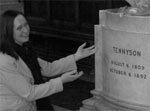Katharine Fletcher - Writer, Executive Editor.
'One of my favourite aspects of Paradise Lost is Milton's presentation of the realm of Chaos. It is really unsettling and much more than even the portrayal of Hell and the fallen angels, creates a feeling of genuine otherness.'
READ MORE 
|
 |
Sarah Howe - Writer, Web Designer.
'In my work, I'm interested in the way that poetry can make us see pictures. When we talk about an "image" in a poem, what do we actually mean? How does Milton put those angels, and that forest, into our mind's eye?'
READ MORE 
|  |
Ned Allen - Writer.
'I came across this passage from Milton's Areopagitica (1644) when I was fifteen. It was in a small brown book, at the back of a second-hand bookshop. The volume was a collection of Milton's shorter poems...'
READ MORE 
|  |
Ewan Bleiman - Writer.
'I always find it important that Milton wrote "justify" rather than something like "explain" or "account for": his is a very constructive act that in the very active sense of "justify" seems almost to make God just, rather than simply to explain how he is just.'
READ MORE 
|
 |
Simon Jackson - Writer.
'Instead of discovering this poem in a book, I first came across "At a Solemn Music" as a piece of music. The occasion was a school concert: the 'mixed power' of the pupils, the teachers, and the parents produced both choir and full orchestra - not quite the 'thousand quires' of the poem, but almost certainly a "harsh din".'
READ MORE 
|  |
Jon Laurence - Writer.
'On my first reading, I set the bar much lower - I just wanted to know what happened. I discovered later that reading Paradise Lost for the plot didn't work particularly well, not least because eight years of Sunday school meant that I was mistakenly sure that I knew what happened.'
READ MORE 
|
 |
Eily-Meg Macqueen - Writer, Editor.
'I love this section because I think Milton creates a believably unknown and chilling place, and his skilful versification makes us feel like we are experiencing it, travelling through it with the devils.'
READ MORE 
|
 |
David Parry - Writer.
'Paradise Lost ends on a note of hope. Having spent hundreds of pages telling us how the world got messed up, Milton wheels in the archangel Michael to reassure Adam (and us) that there's a happy ending to the story, before kicking him out of the garden.'
READ MORE 
|
 |
|
 |
Gabriel Roberts - Writer, Editor.
'When I first read Lycidas, these lines seemed to cry out, the poem suddenly questioning its own imagery, turning back on itself and gesturing to a grief existing somehow beyond or prior to the poem itself.'
READ MORE 
|
 |
Ruth Rushworth - Writer, Editor.
'This epic marks for English literature a similar feat to that of the first man on the moon. Or rather, it is as if Milton had just landed on Mars while the rest of the world was still stuck on the moon.'
READ MORE 
|
 |
Beth Sims - Writer, Design Assistant.
'Whilst Sin is feminine, she is only "woman to the waist". She appears, like a mermaid, or like a Barbie doll, to have no genitalia. How can we then be certain that she is female? It is an assumption which comes with gendered language.'
READ MORE 
|
 |
Nicholas Zeng - Writer.
'Satan has been seen by many critics, notably a large number of the Romantics including Blake, as the tragic hero of Paradise Lost. While this may be an exaggeration (especially in the light of his abject and craven trickery later in the poem), the faux-nobility of Satan is certainly evident...'
READ MORE 
|
 |
|
 |















